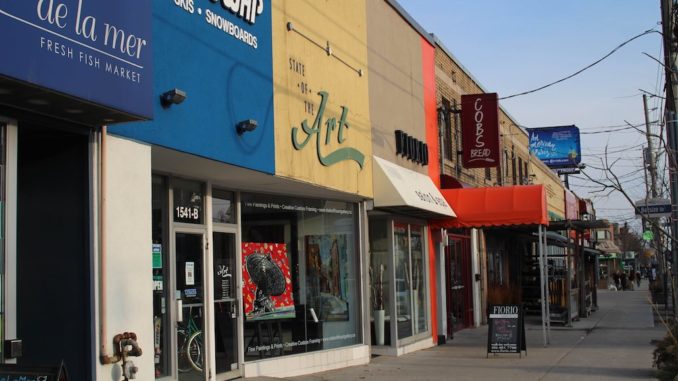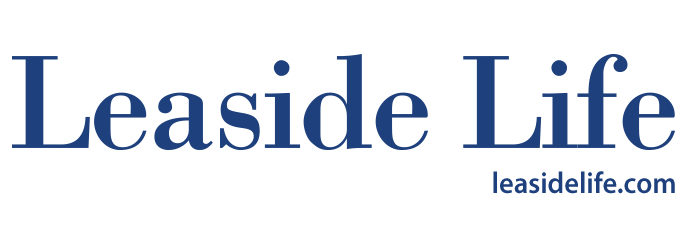
By the time you read this, Canada’s tariff relationship with the U.S. might have changed…several times!
Given the fluid (nice term) nature of our tariff relationship with the U.S., and trade issues with China, I sought to discover how different types of businesses at least anticipated how they might be affected.
Vibrant local business is essential to our strong community. Period, full stop. We know that business owners are losing sleep around tariffs, so I hit the streets of Leaside to talk to a few different types of businesses and find out exactly what’s keeping them up.
I decided to profile Leaside businesses in four different sectors: a merchant, a distributor, a brand/restaurateur and a manufacturer.
You might be surprised at my discoveries. A hint: There are tariffs on our exports, but there are also counter-tariffs placed by our government on American imports. The latter really matters.
Merchant profile Grilltime Gourmet Meat Shop
In relative terms, owner Andy Elder has less to worry about when it comes to tariffs because his product already comes almost exclusively from Canadian suppliers who sell meat and other products sourced from Canada. This includes local specialty products like the spices Grilltime proudly supports.
But he is concerned his prices may go up when his suppliers are faced with increased demand from new customers who had been buying from American suppliers. “We do a strong business each year with our Cottage Packs that have a variety of products in them. It is hard for us to promote them in advance because we don’t know how to price them.”
Andy’s other concern is that consumer spend will decrease because of increased costs from other life elements affected by tariffs. While Grilltime’s pricing is reasonable, it’s still cheaper to eat at home.
Distributor profile The Tate Group
Gift distributor The Tate Group has been selling great things to great stores for 25 years. Like most businesses, the gift industry has changed over the years, but as president Stan Flemming says from his Leaside office, this tariff ordeal might be a doozy!
“Over the years, we have worked hard to develop and maintain great relationships with suppliers and retailers so that together we bring innovative gift products that consumers want – and at a price they will pay. Now that price-point may be beyond reach.”
That’s the kicker. We are not talking about milk and eggs here but gifts that are extremely price sensitive and “nice-to-haves.” Tariffs whether imposed on imports into the U.S. or reciprocal punitive tariffs imposed by Canada, will surely result in increased prices for retailers and, ultimately, consumers .
Brand and restaurant profile Amsterdam Brewery
The brewery/brand side
Like other craft brewers, beer production costs will rise because of the costs of aluminum, as well as raw ingredients that have traditionally come from the U.S. Now, before everyone yells and screams that they should buy ingredients like hops from Canadian suppliers, it’s not that simple. The case is similar for many micro-breweries. The fact is that Canada does not produce hops with the flavour profiles that many breweries require. Amsterdam is now looking at hops from across the pond, specifically from Great Britain, maker of outstanding hops.
Another interesting point brought up by Amsterdam’s Matt Peacock is the much-ballyhooed inter-provincial tariffs. As a brewer, they are keen to see these walls go down so they can freely sell across the country (for the most part). A chunk of market share is opening with American-made products (not necessarily American brands) coming off the shelf, and the independent smaller brewers like Amsterdam are hoping to fill that void in beer mugs nationwide.
The restaurant side
As the general manager of their Barrel House restaurant, Matt is also concerned about reduced household discretionary funds that will lead to less money spent in restaurants overall. So, the game is to get a bigger piece of a smaller pie.
Matt has a plan; it’s called loyalty.
He knows that his overall number of unique customers will decline, so he needs to focus on increasing the frequency of visits by his best customers. Although his best customers may have a lower average transaction value, he is confident their increased frequency will make up the revenue gap. “Loyalty is always a really good strategy but never more important than it is now for establishments like The Barrel House. Love your customers and they will love you back.”
Industrial manufacturer profile Unicell
Many people likely remember driving up Laird for years and wondering what that place was on the east side that had dozens and dozens of white trucks parked in the lot. The sign said DEL and the trucks said Unicell, but what in the name of pickleball does that company do?
It’s Unicell, a unique Canadian company that produces and fits custom one-piece fibreglass bodies onto trucks.
Having many U.S. customers, Unicell expanded from Leaside, adding a second plant in Buffalo in the 1990s. That worked for years, until the pandemic. Remember Covid? Perhaps not all of us need a reminder about the microchip shortage. Supply chain disruptions and realignments meant that for almost two years carmakers couldn’t get enough chips, so they couldn’t make enough new cars. By extension, this chip shortage also meant that the trucks Unicell builds onto weren’t being produced, robbing Unicell of its essential input and revenue.
Faced with the prospect of being starved to death, Unicell consolidated into its Buffalo plant. With agreement from Ford and GM, Unicell was allowed to send Canadian trucks to its Buffalo plant for completion and then back to Canada for final sale. All good…until the tariff threat.
President Hugh Martin explained their unique issue. “While we are able to move the truck across the border tariff-free, since it is only temporarily entering the U.S. for work to be done, it now faces a very curious threat. The body made in our Buffalo plant will get caught up in proposed Canadian retaliatory tariffs.” So, Unicell can’t bring its bodies back to Canada without getting whacked with an extra 25% charge. Their customers might not stomach that kind of increase, and if Unicell tries to absorb it, they would sell each truck at a loss.
The Bayview Leaside BIA perspective
I sat down recently with Henry Byres, program coordinator for the Bayview Leaside BIA. While he couldn’t speak on behalf of the membership, he did acknowledge that Main Street businesses could be adversely affected by reduced consumer spending resulting from increased prices from tariffs and overall economic uncertainty.
However, he too was quick to point out the importance of customer loyalty in weathering challenging economic times, especially for small, independent businesses. “Bayview Leaside is home to an impressive collection of small, owner-operated businesses in the specialty retail, food and personal service sectors, and Covid demonstrated that our area has a very loyal customer base, many of whom live locally and take pride in helping to keep our main street vibrant. We’re going to need their continued support.”
With respect to the BIA’s role in helping member businesses meet the tariff challenge, Henry suggests not much will change. If the BIA can help attract people to the area, then the strength of the local businesses will encourage them to stay longer and keep them coming back.
What does MPP Stephanie Bowman say?
At the Leaside Business Park Association meeting in late March, MPP Stephanie Bowman encouraged businesses to contact her and share how the impending tariff war could affect them.
From those she heard from, the number one concern by far was the distress and worry caused by the uncertainty of a situation changing week by week. As any business owner will tell you, uncertainty is a major source of concern.
On the positive side, she is encouraged by what she heard from many of these same businesses, that they are focused on ways to be nimbler. “Local businesses big and small are being flexible and actively searching alternative supply chains and markets. And they are having success at it.”
So, what does this all mean?
After speaking to these stakeholders and so many others, I created some sophisticated algorithms and complicated financial models on my supercomputer to understand what this means for little Leaside. When I pressed “go,” here’s what it told me.
Leaside is a thriving community we are all proud and lucky to call home. One of the reasons it is so strong is our vibrant local business community, from merchants to services to manufacturers, and everything and everyone in between. Just as it is Leaside Life’s role to keep us informed, it is our role as residents to support our local businesses, and it’s their role to support community initiatives. A virtuous circle.
Strong communities need strong local business to thrive, so let’s make sure we keep ours that way, tariffs be damned.
This article was guest contributed by Mike Zivot.

